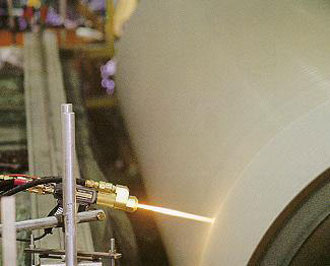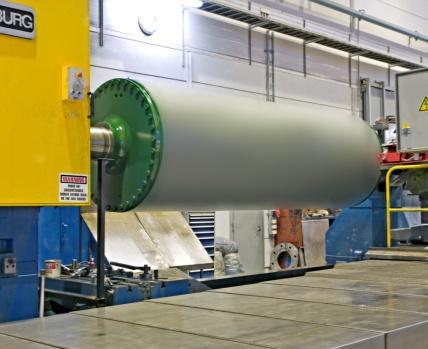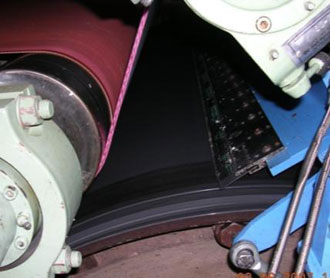
Thermal sprayed coatings
AK-CARBIDE
Applications: lead rolls, pope reel rolls, winder drive rolls
Technical specifications
- Cover thickness: 60–300 μm, usually 60–80 or 120–150 μm.
- Hardness: 1,100–1,200 HV
- Maximum usage temperature: No limitation
- Surface roughness: 4–5 µm
- Colour: Grey
- Doctoring: Carbon fibre composite blade
AK-CARBIDE is a conventional, high-friction cover made of thermally sprayed tungsten carbide. It has excellent wear resistance and a long grinding interval. The coating can be deep cleaned by sandblasting it once over the course of its service life.
Advantages
- Excellent wear resistance.
- High friction.
- Excellent doctoring properties.
- Allows for on-site coating.

AK-CARBIDE C
Applications: hard rolls, thermo rolls and deflection-compensated rolls in super, soft and multinip calenders
Technical specifications
- Cover thickness: 100–300 µm
- Hardness: 1,100–1,200 HV
- Surface roughness: 0.04–0.08 µm
- Maximum usage temperature: No limitation
- Allowed maximum load: No limitation
- Colour: Grey/chromium
- Recommendation for doctoring: Carbon fibre composite blade
AK-CARBIDE C is a thermally sprayed tungsten carbide cover with a long grinding interval. The excellent wear resistance of the cover helps maintain the surface roughness consistent, thereby contributing to the paper’s excellent transverse profile throughout the operating period.
Advantages
- Excellent wear resistance.
- Long grinding intervals.
- Excellent surface quality.
AK-CARBIDE D
Applications: lead rolls, spreader rolls and drying cylinders
Technical specifications
- Cover thickness: 100–200 µm
- Hardness: 900–1,300 HV
- Maximum usage temperature: 160°C (continuous)
- Chemical resistance: Excellent
- Colour: Grey
- Doctoring: Carbon fibre composite blade
AK-CARBIDE D combines thermally sprayed tungsten carbide and fluoropolymer surface treatment. The Dyrel fluoropolymer provides cleanliness and chemical resistance similar to those of sintered PTFE/FEP materials. Furthermore, it provides first-rate doctoring properties and corrosion resistance. The Dyrel fluoropolymer maintains its hardness at high temperatures considerably better than conventional PTFE/FEP materials.
Advantages
- Excellent cleanability and chemical resistance.
- Good doctoring properties and corrosion resistance.
- Maintains its hardness at high temperatures.
- Suitable for on-site coating.

AK- CERAM
Applications: centre press rolls, shoe press counter rolls
Technical specifications
- Cover thickness: 650–700 µm
- Hardness: 900–1,100 HV
- Surface roughness: 0.6–1.6 µm
- Maximum usage temperature: No limitation
- Allowed maximum load: No limitation
- Colour: Dark grey
- Chemical resistance: Excellent
- Recommendation for doctoring: Carbon fibre composite blade
AK-CERAM is a thermally sprayed ceramic roll cover with excellent corrosion resistance and wear properties, optimal web release properties and first-rate doctoring properties.
Advantages
- Excellent corrosion resistance.
- Very good web release properties.
- Excellent wear resistance.
- Stable surface roughness value.
- First-rate doctoring properties.
- Very good chemical resistance.

AK-CERAM L
Applications: lead rolls
Technical specifications
- Cover thickness: 100–250 µm
- Hardness: 900–1,100 HV
- Surface roughness: 0.6–1.6 µm
- Maximum usage temperature: No limitation
- Allowed maximum load: No limitation
- Colour: dark grey
- Chemical resistance: Excellent
- Recommendation for doctoring: Carbon fibre composite blade
The thermally sprayed ceramic AK-CERAM L lead rolls replace conventional electrolytic chromium roll covers. The cover is manufactured at our own factory, which reduces the lead time.
AK-CERAM L is a hydrophilic and very hard material, which prevents dirt from sticking and allows easier mechanical removal of any residue and other contaminants.
Advantages
- Excellent wear resistance.
- First-rate doctoring properties.
- Very good chemical resistance.
- Can be cleaned mechanically.

AK-CARBIDE N
Applications: lead rolls, spreader rolls and drying cylinders
Technical specifications
- Cover thickness: 100–200 µm Hardness: 1,100–1,200 HV
- Maximum usage temperature: 130°C (continuous)
- Chemical resistance: Excellent
- Colour: Grey
- Doctoring: Carbon fibre composite blade
AK-CARBIDE N combines tungsten carbide with nanotechnology-based Avalon™ sol-gel treatment. It has excellent wear resistance, cleanliness and cleanability properties.
Advantages
- Excellent wear resistance.
- Excellent cleanliness.
- Easy to clean.

AK-CARBIDE R
Applications: lead rolls, spreader rolls and drying cylinders
Technical specifications
- Cover thickness: 100–200 µm
- Hardness: 1,100–1,200 HV
- Maximum usage temperature: 260°C (continuous)
- Friction coefficient: 0.10–0.25
- Colour: Dark grey
- Doctoring: Carbon fibre composite blade
AK-CARBIDE R combines tungsten carbide with Teflon®. The cover has excellent wear resistance and very good cleanliness and release properties.
Advantages
- Excellent wear resistance.
- Very good cleanliness.
- Easy to clean.

AK-CERAM W
Applications: centre press rolls, shoe press counter rolls
Technical specifications
- Cover thickness: 650–700 µm
- Hardness: 1,000–1,200 HV
- Surface roughness: 0.6–1.6 µm
- Maximum usage temperature: No limitation
- Allowed maximum load: No limitation
- Colour: Dark grey
- Chemical resistance: Excellent
- Recommendation for doctoring: Carbon fibre composite blade
AK-CERAM W is a thermally sprayed ceramic roll cover with excellent corrosion resistance and wear properties, optimal web release properties and first-rate doctoring properties. The combination raw material makes it very well suited for woodcontaining papers with a high concentration of additives, including newsprint, SC and LWC paper.
Advantages
- Excellent corrosion resistance.
- Very good sheet release properties.
- Excellent wear resistance.
- Stable surface roughness value.
- First-rate doctoring properties.
- Very good chemical resistance.




